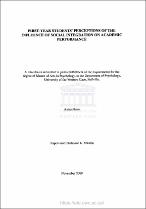First year students' perceptions of the influence of social integration on academic performance
Abstract
During Apartheid, South African education policies were largely based on a system of racial segregation, resulting in unequal educational opportunities between black and white students. Current education policies centred on Access and Equity have been ratified to address the education issues of the past. However, there still remains a concern about the poor performance and consequently, the high drop out rate, particularly amongst black South African university students. The findings of various studies have shown that the factors that contribute to poor academic performance range from inadequate pre-university schooling and financial issues to poor language proficiency, inadequate social support and insufficient social integration. The present study employed a qualitative approach to explore first-year students' perceptions of the influence of social integration on academic performance. Tinto's Student Integration Model provided the conceptual basis for the conduction of the study. Three focus groups were used to collect the data which were analysed according to thematic analysis procedures. The main finding of the study was that academic and social experiences were intrinsically linked in the first year of study. Moreover, the findings indicate that friends, belonging to nonacademic organisations and lecturer-student interaction (as three indicators of social integration) influenced first-year students' academic performance. South African contextual factors such as socio-economic status and language were found to be a potential hindrance to good academic performance. The implications of these findings are discussed.

